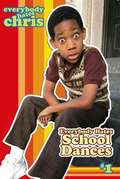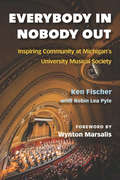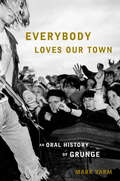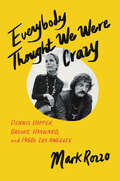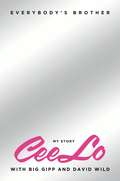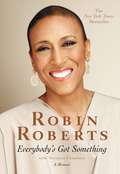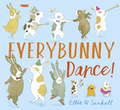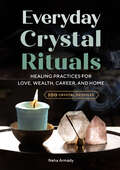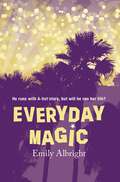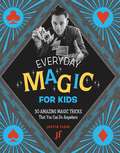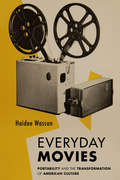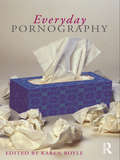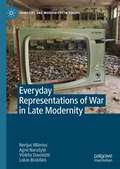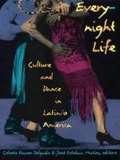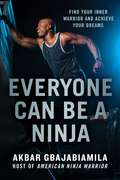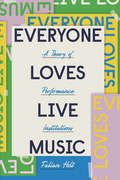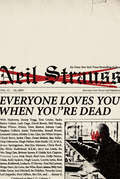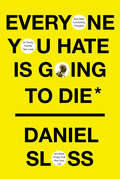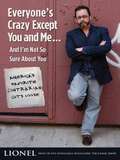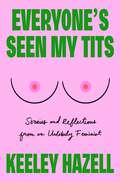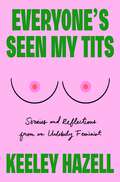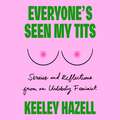- Table View
- List View
Everybody Hates School Dances
by Brian JamesFed up with being teased by the school bully, Chris blurts out that he's going to the school dance on Friday with the prettiest girl in Bed-Stuy -- and that he's taking her in a limousine! Word travels fast, and soon Chris has only four days to find a date and a limousine, or he'll be the laughingstock of Corleone Jr. High. As if that wasn't bad enough, he somehow lets it slip that he is the best break-dancer in all of Brooklyn -- and all the kids at school want to see him prove it on the dance floor. Can Chris get out of this mess without getting caught or beaten up? Probably not, but he's going to try!
Everybody In, Nobody Out: Inspiring Community at Michigan's University Musical Society
by Ken FischerHoused on the campus of the University of Michigan in Ann Arbor, the University Musical Society is one of the oldest performing arts presenters in the country. A past recipient of the National Medal of Arts, the nation’s highest public artistic honor, UMS connects audiences with wide-ranging performances in music, dance, and theater each season.Between 1987 and 2017, UMS was led by Ken Fischer, who over three decades pursued an ambitious campaign to expand and diversify the organization’s programming and audiences—initiatives inspired by Fischer’s overarching philosophy toward promoting the arts, “Everybody In, Nobody Out.” The approach not only deepened UMS’s engagement with the university and southeast Michigan communities, it led to exemplary partnerships with distinguished artists across the world. Under Fischer’s leadership, UMS hosted numerous breakthrough performances, including the Vienna Philharmonic’s final tour with Leonard Bernstein, appearances by then relatively unknown opera singer Cecilia Bartoli, a multiyear partnership with the Royal Shakespeare Company, and artists as diverse as Yo-Yo Ma, Jawole Willa Jo Zollar, Elizabeth Streb, and Nusrat Fateh Ali Khan. Though peppered with colorful anecdotes of how these successes came to be, this book is neither a history of UMS nor a memoir of Fischer’s significant accomplishments with the organization. Rather it is a reflection on the power of the performing arts to engage and enrich communities—not by handing down cultural enrichment from on high, but by meeting communities where they live and helping them preserve cultural heritage, incubate talent, and find ways to make community voices heard.
Everybody Loves Our Town: A History of Grunge
by Mark YarmTwenty years after the release of Nirvana's landmark album Nevermind comes Everybody Loves Our Town: An Oral History of Grunge, the definitive word on the grunge era, straight from the mouths of those at the center of it all. In 1986, fledgling Seattle label C/Z Records released Deep Six, a compilation featuring a half-dozen local bands: Soundgarden, Green River, Melvins, Malfunkshun, the U-Men and Skin Yard. Though it sold miserably, the record made music history by documenting a burgeoning regional sound, the raw fusion of heavy metal and punk rock that we now know as grunge. But it wasn't until five years later, with the seemingly overnight success of Nirvana's "Smells Like Teen Spirit," that grunge became a household word and Seattle ground zero for the nineties alternative-rock explosion.Everybody Loves Our Town captures the grunge era in the words of the musicians, producers, managers, record executives, video directors, photographers, journalists, publicists, club owners, roadies, scenesters and hangers-on who lived through it. The book tells the whole story: from the founding of the Deep Six bands to the worldwide success of grunge's big four (Nirvana, Pearl Jam, Soundgarden and Alice in Chains); from the rise of Seattle's cash-poor, hype-rich indie label Sub Pop to the major-label feeding frenzy that overtook the Pacific Northwest; from the simple joys of making noise at basement parties and tiny rock clubs to the tragic, lonely deaths of superstars Kurt Cobain and Layne Staley. Drawn from more than 250 new interviews--with members of Nirvana, Pearl Jam, Soundgarden, Alice in Chains, Screaming Trees, Hole, Melvins, Mudhoney, Green River, Mother Love Bone, Temple of the Dog, Mad Season, L7, Babes in Toyland, 7 Year Bitch, TAD, the U-Men, Candlebox and many more--and featuring previously untold stories and never-before-published photographs, Everybody Loves Our Town is at once a moving, funny, lurid, and hugely insightful portrait of an extraordinary musical era.From the Hardcover edition.
Everybody Thought We Were Crazy: Dennis Hopper, Brooke Hayward, and 1960s Los Angeles
by Mark RozzoThe stylish, wild story of the marriage of Dennis Hopper and Brooke Hayward—a tale of love, art, Hollywood, and heartbreak “Those years in the sixties when I was married to Dennis were the most wonderful and awful of my life.” —Brooke HaywardLos Angeles in the 1960s: riots in Watts and on the Sunset Strip, wild weekends in Malibu, late nights at The Daisy discotheque, openings at the Ferus Gallery, and the convergence of pop art, rock and roll, and the New Hollywood. At the center of it all, one inspired, improbable, and highly combustible couple—Dennis Hopper and Brooke Hayward—lived out the emblematic love story of ’60s L.A.The home these two glamorous young actors created for themselves and their family at 1712 North Crescent Heights Boulevard in the Hollywood Hills became the era’s unofficial living room, a kaleidoscopic realm—“furnished like an amusement park,” Andy Warhol said—that made an impact on anyone who ever stepped into it. Hopper and Hayward, vanguard collectors of contemporary art, packed the place with pop masterpieces by the likes of Roy Lichtenstein, Ed Ruscha, and Warhol, and welcomed a who’s who of visitors, from Jane Fonda to Jasper Johns, Joan Didion to Tina Turner, Hells Angels to Black Panthers. In this house, everything that defined the 1960s went down: the fun, the decadence, the radical politics, and, ultimately, the danger and instability that Hopper explored in the project that made his career, became the cinematic symbol of the period, and blew their union apart—Easy Rider.Everybody Thought We Were Crazy is at once a fascinating account of the Hopper and Hayward union and a deeply researched, panoramic cultural history. It’s the intimate saga of one couple whose own rise and fall—from youthful creative flowering to disorder and chaos—mirrors the very shape of the decade.
Everybody's Brother
by David Wild Big Gipp Ceelo GreenHe inspires awe with his colorful costumes and helps ordinary people find a Voice. With vocals so effective (in fact, they're almost otherworldly), he turned a four-letter word into a global phenomenon. Without a doubt, CeeLo Green is a superhero of soul-and every superhero has an origin story. This story begins in The Dirty South, where South Atlanta's native son transformed himself into the Abominable SHOWman. Along the way, innocence was lost; farther down the path, his parents passed on. Yet he still found family at the Dungeon with the likes of Goodie Mob, Outkast, L.A. Reid, and Lauryn Hill. Then one day he teamed up with Danger Mouse and everything went "Crazy." Everybody's Brother is the untold story of CeeLo Green's rise from the streets of Atlanta to the top of the charts-a story so cool, so complex that his brother-from-another-mother, Big Gipp, couldn't help but chime in. Now CeeLo gives his fans what they've been waiting for: an all-access pass into his perfectly imperfect piece of mind.
Everybody's Got Something
by Veronica Chambers Robin Roberts"Regardless of how much money you have, your race, where you live, what religion you follow, you are going through something. Or you already have or you will. As momma always said, "Everybody's got something." So begins beloved Good Morning America anchor Robin Roberts's new memoir in which she recounts the incredible journey that's been her life so far, and the lessons she's learned along the way. With grace, heart, and humor, she writes about overcoming breast cancer only to learn five years later that she will need a bone marrow transplant to combat a rare blood disorder, the grief and heartbreak she suffered when her mother passed away, her triumphant return to GMA after her medical leave, and the tremendous support and love of her family and friends that saw her through her difficult times. Following her mother's advice to "make your mess your message," Robin taught a nation of viewers that while it is true that we've all got something -- a medical crisis to face, aging parents to care for, heartbreak in all its many forms --- we've also all got something to give: hope, encouragement, a life-saving transplant or a spirit-saving embrace. As Robin has learned, and what readers of her remarkable story will come to believe as well, it's all about faith, family and friends. And finding out that you are stronger, much stronger, than you think.
Everybody's Grandpa: Fifty Years Behind the Mike
by Louis M. Jones Charles Wolfe Grandpa JonesBiography of country musician Grandpa Jones including a discography and bibliography
Everybunny Dance
by Ellie SandallA joyful rhyming story about friendship and looking beyond appearances. Perfect for Easter!Did you know that bunnies love to dance? Did you know they love to sing and play the flute? There's a lot they get up to when nobody's watching!But while they're having fun, they don't notice that a fox is creeping nearer. Does he mean trouble? Or does he just want to play?Little ones will love sharing this story together and joining in with all the dance moves! The perfect picture book for Easter, or for any time of the year."The rhyming text skips along and is complemented by joyous illustrations." Booktrust
Everyday Crystal Rituals: Healing Practices for Love, Wealth, Career, and Home
by Naha ArmádyManifest desires with crystal healing prescriptions for your home, career, and relationship from Everyday Crystal Rituals. Crystal rituals channel inner desires to create outward change. In Everyday Crystal Rituals, you'll learn practical applications to crystal healing and manifest the life you want to lead at home, work, and in love. From mending broken hearts, to removing career obstacles, to inviting creativity into your home, these rituals make sacred practices part of your daily routine. Complete with 100 crystal profiles that explain their individual healing powers, plus an introduction on tuning into crystal energy, Everyday Crystal Rituals is your down-to-earth guide for healing with crystals. Everyday Crystal Rituals awakens your ability to live in fulfillment, love, and abundance with: An introduction to crystal healing that explains how to call on crystal energy and manifest powerful intentions with purpose. 60 rituals for focused healing of real obstacles around love and relationships, career, wealth, and home life. 100 profiles of the most common crystals with practical information on how to use them to achieve your life goals. Whether you're new to working with crystals or they're already a big part of your life, Everyday Crystal Rituals makes manifesting positive change a daily ritual.
Everyday Magic
by Emily AlbrightFrom the critically acclaimed author of The Heir and the Spare comes another enchanting tale of love and fame set in England, among the privileges and pressures of the red-carpet life. Maggie's dad is a Hollywood director, and he has her whole life planned: Not only will she grow up to be an entertainment lawyer and work for him, he literally blackmails her to date the boy who's starring in his new movie. But Maggie loves Preston, the British boy who stole her heart, and despite the risk that her dad will make her mother miserable if she doesn't give in, Maggie decides to go for it, designing a red-carpet gown for a young duchess that puts her and the duchess in the limelight. Once there, she turns to Preston and issues a challenge: Can a girl who has given up the glamorous life any other girl would want...be the girl for him?
Everyday Magic for Kids: 30 Amazing Magic Tricks That You Can Do Anywhere
by Justin FlomPerfect the art of magic with simple every day objects and tips from professional magician Justin Flom.Using every day objects, daring magician Justin Flom (434K Facebook followers and 153K subscribers on YouTube) will teach kids all they need to know to perform 30 amazing and how-did-you-do-that magic tricks at the turn of a hat. Featuring step-by-step instructions and illustrations, Everyday Magic for Kids will give budding magicians all the tips they need in order to wow their friends and family, whether at home, at school, or on the go. Tricks will vary from card tricks to tricks with coins and other small objects to tricks that can be done with friends/family members. The book also includes introductory material about how to act like a magician and the basics of performing magic in front of an audience (be it a friend or a room of people).
Everyday Movies: Portable Film Projectors and the Transformation of American Culture
by Haidee WassonEveryday Movies documents the twentieth-century rise of portable film projectors. It demonstrates that since World War II, the vast majority of movie-watching did not happen in the glow of the large screen but rather took place alongside the glitches, distortions, and clickety-clack of small machines that transformed home, classroom, museum, community, government, industrial, and military venues into sites of moving-image display. Reorienting the history of cinema away from the magic of the movie theater, Haidee Wasson illustrates the remarkable persistence and proliferation of devices that fundamentally rejected the sleek, highly professionalized film show. She foregrounds instead another kind of apparatus, one that was accessible, affordable, adaptable, easy to use, and crucially, programmable. Revealing rich archival discoveries, this book charts a compelling and original history of film that brings to light new technologies and diverse forms of media engagement that continue to shape contemporary life.
Everyday Pornography
by Karen BoylePublic and academic debate about ‘porn culture’ is proliferating. Ironically, what is often lost in these debates is a sense of what is specific about pornography. By focusing on pornography’s mainstream – contemporary commercial products for a heterosexual male audience – Everyday Pornography offers the opportunity to reconsider what it is that makes pornography a specific form of industrial practice and genre of representation. Everyday Pornography presents original work from scholars from a range of academic disciplines (Media Studies, Law, Sociology, Psychology, Women’s Studies, Political Science), introducing new methodologies and approaches whilst reflecting on the ongoing value of older approaches. Among the topics explored are: the porn industry’s marketing practices (spam emails, reviews) and online organisation commercial sex in Second Life the pornographic narratives of phone sex and amateur videos the content of best-selling porn videos how the male consumer is addressed by pornography, represented within the mainstream, understood by academics and contained by legislation. This collection places a particular emphasis on anti-pornography feminism, a movement which has been experiencing a revival since the mid-2000s. Drawing on the experiences of activists alongside academics, Everyday Pornography offers an opportunity to explore the intellectual and political challenges of anti-pornography feminism and consider its relevance for contemporary academic debate.
Everyday Representations of War in Late Modernity (Identities and Modernities in Europe)
by Violeta Davoliūtė Nerijus Milerius Agnė Narušytė Lukas BrašiškisThis book analyses photographic and cinematographic representations of war and its memorialisation rituals in the period of late modernity from the perspectives of cultural sociology, philosophy, art theory and film studies. It reveals how the experience of war trauma takes root in everydayness and shows how artists try to question the ‘normality’ of the everyday, to actualise the memory of war trauma, to rethink the contrasting experiences of the time of war and everydayness, and to oppose the imposed historical narratives. The new representations are analysed by developing theories of war as a ‘magic spectacle’, also by using such concepts as spectres, triumph and trauma, collective social catastrophes, forensic architecture and others.
Everynight Life: Culture and Dance in Latin/o America
by José Esteban Muñoz Celeste Fraser DelgadoThe function of dance in Latin/o American culture is the focus of the essays collected in Everynight Life. The contributors interpret how Latin/o culture expresses itself through dance, approaching the material from the varying perspectives of literary, cultural, dance, performance, queer, and feminist studies. Viewing dance as privileged sites of identity formation and cultural resistance in Latin/o America, Everynight Life translates the motion of bodies into speech, and the gestures of dance into a provocative socio-political grammar.This anthology looks at many modes of dance--including salsa, merengue, cumbia, rumba, mambo, tango, samba, and norteño--as models for the interplay of cultural memory and regional conflict. Barbara Browning's essay on capoeira, for instance, demonstrates how dance has been used as a literal form of resistance, while José Piedra explores the meanings conveyed by women of color dancing the rumba. Pieces such as Gustavo Perez Fírmat's "I Came, I Saw, I Conga'd" and Jorge Salessi's "Medics, Crooks, and Tango Queens" illustrate the lively scope of this volume's subject matter.Contributors. Barbara Browning, Celeste Fraser Delgado, Jane C. Desmond, Mayra Santos Febres, Juan Carlos Quintero Herencia, Josh Kun, Ana M. López, José Esteban Muñoz, José Piedra, Gustavo Perez Fírmat, Augusto C. Puleo, David Román, Jorge Salessi, Alberto Sandoval
Everyone Can Be a Ninja: Find Your Inner Warrior and Achieve Your Dreams
by Akbar GbajabiamilaThe beloved host of the NBC hit show American Ninja Warrior draws inspiration from both the fierce competitors on his show and his own unlikely path to success to outline the essential steps to achieving your goals and becoming a modern-day ninja.Akbar Gbajabiamila, the host of NBC’s hit Emmy-nominated show, American Ninja Warrior, did not have an easy path to success. One of seven children by Nigerian immigrant parents, he grew up in the Crenshaw district of South Central Los Angeles during the 1980s and ’90s, a time when the neighborhood was fraught with riots and gang violence. With dreams of playing professional basketball, Gbajabiamila found success not in the sport he loved, but in football. Late in his high school career, Gbajabiamila suited up with pads for the first time and was thrown into the complex sport of football. He climbed major hurdles to play college football and then professional football. After playing in the NFL, it was only after years of hard work behind-the-scenes in radio and television that he was offered the job to be the host of American Ninja Warrior. Through his own inspirational underdog stories and interviews with modern-day ninjas who have accomplished extraordinary things in their own lives against the odds, Akbar proves in Everyone Can Be a Ninja that it doesn’t matter if you make it through every step of the obstacle course on the first try. Ninjas keep pushing themselves until they reach their goals, and they don’t let anyone or anything stand in their way. It is easy to see greatness in others; it’s hard to see it in ourselves. Everyone Can Be a Ninja shows you that we can fulfill our potential and achieve our dreams by finding our inner warriors.
Everyone Loves Live Music: A Theory of Performance Institutions (Big Issues in Music)
by Fabian HoltFor decades, millions of music fans have gathered every summer in parks and fields to hear their favorite bands at festivals such as Lollapalooza, Coachella, and Glastonbury. How did these and countless other festivals across the globe evolve into glamorous pop culture events, and how are they changing our relationship to music, leisure, and public culture? In Everyone Loves Live Music, Fabian Holt looks beyond the marketing hype to show how festivals and other institutions of musical performance have evolved in recent decades, as sites that were once meaningful sources of community and culture are increasingly subsumed by corporate giants. Examining a diverse range of cases across Europe and the United States, Holt upends commonly-held ideas of live music and introduces a pioneering theory of performance institutions. He explores the fascinating history of the club and the festival in San Francisco and New York, as well as a number of European cities. This book also explores the social forces shaping live music as small, independent venues become corporatized and as festivals transform to promote mainstream Anglophone culture and its consumerist trappings. The book further provides insight into the broader relationship between culture and community in the twenty-first century. An engaging read for fans, industry professionals, and scholars alike, Everyone Loves Live Music reveals how our contemporary enthusiasm for live music is more fraught than we would like to think.
Everyone Loves Live Music: A Theory of Performance Institutions (Big Issues in Music)
by Fabian HoltFor decades, millions of music fans have gathered every summer in parks and fields to hear their favorite bands at festivals such as Lollapalooza, Coachella, and Glastonbury. How did these and countless other festivals across the globe evolve into glamorous pop culture events, and how are they changing our relationship to music, leisure, and public culture? In Everyone Loves Live Music, Fabian Holt looks beyond the marketing hype to show how festivals and other institutions of musical performance have evolved in recent decades, as sites that were once meaningful sources of community and culture are increasingly subsumed by corporate giants. Examining a diverse range of cases across Europe and the United States, Holt upends commonly-held ideas of live music and introduces a pioneering theory of performance institutions. He explores the fascinating history of the club and the festival in San Francisco and New York, as well as a number of European cities. This book also explores the social forces shaping live music as small, independent venues become corporatized and as festivals transform to promote mainstream Anglophone culture and its consumerist trappings. The book further provides insight into the broader relationship between culture and community in the twenty-first century. An engaging read for fans, industry professionals, and scholars alike, Everyone Loves Live Music reveals how our contemporary enthusiasm for live music is more fraught than we would like to think.
Everyone Loves Live Music: A Theory of Performance Institutions (Big Issues in Music)
by Fabian HoltFor decades, millions of music fans have gathered every summer in parks and fields to hear their favorite bands at festivals such as Lollapalooza, Coachella, and Glastonbury. How did these and countless other festivals across the globe evolve into glamorous pop culture events, and how are they changing our relationship to music, leisure, and public culture? In Everyone Loves Live Music, Fabian Holt looks beyond the marketing hype to show how festivals and other institutions of musical performance have evolved in recent decades, as sites that were once meaningful sources of community and culture are increasingly subsumed by corporate giants. Examining a diverse range of cases across Europe and the United States, Holt upends commonly-held ideas of live music and introduces a pioneering theory of performance institutions. He explores the fascinating history of the club and the festival in San Francisco and New York, as well as a number of European cities. This book also explores the social forces shaping live music as small, independent venues become corporatized and as festivals transform to promote mainstream Anglophone culture and its consumerist trappings. The book further provides insight into the broader relationship between culture and community in the twenty-first century. An engaging read for fans, industry professionals, and scholars alike, Everyone Loves Live Music reveals how our contemporary enthusiasm for live music is more fraught than we would like to think.
Everyone Loves You When You're Dead
by Neil StraussNeil Strauss can uncover the naked truth like nobody else. With his groundbreaking book The Game, Strauss penetrated the secret society of pickup artists. Now, in Everyone Loves You When You're Dead, the Rolling Stone journalist collects the greatest moments from the most insane music interviews of all time. Join Neil Strauss, "The Mike Tyson of interviewers," (Dave Pirner, Soul Asylum), as he Makes Lady Gaga cry, tries to keep MÖtley CrÜe out of jail & is asked to smoke Kurt Cobain's ashes by Courtney Love Shoots guns with Ludacris, takes a ride with Neil Young & goes to church with Tom Cruise and his mother Spends the night with Trent Reznor, reads the mind of Britney Spears & finds religion with Stephen Colbert Gets picked on by Led Zeppelin, threatened by the mafia & serenaded by Leonard Cohen Picks up psychic clues with the CIA, diapers with Snoop Dog & prison survival tips from Rick James Goes drinking with Bruce Springsteen, dining with Gwen Stefani & hot tubbing with Marilyn Manson Talks glam with David Bowie, drugs with Madonna, death with Johnny Cash & sex with Chuck Berry Gets molested by the Strokes, in trouble with Prince & in bed with . . . you'll find out who inside. Enjoy many, many more awkward moments and accidental adventures with the world's number one stars in Everyone Love You When You're Dead.
Everyone You Hate Is Going to Die: And Other Comforting Thoughts on Family, Friends, Sex, Love, and More Things That Ruin Your Life
by Daniel SlossOne of this generation's hottest and boldest young comedians presents a transgressive and hilarious analysis of all of our dysfunctional relationships, and attempts to point us in the vague direction of sanity.Daniel Sloss's stand-up comedy engages, enrages, offends, unsettles, educates, comforts, and gets audiences roaring with laughter—all at the same time. In his groundbreaking specials, seen on Netflix and HBO, he has brilliantly tackled everything from male toxicity and friendship to love, romance, and marriage—and claims (with the data to back it up) that his on-stage laser-like dissection of relationships has single-handedly caused more than 300 divorces and 120,000 breakups. Now, in his first book, he picks up where his specials left off, and goes after every conceivable kind of relationship—with one's country (Sloss's is Scotland); with America; with lovers, ex-lovers, ex-lovers who you hate, ex-lovers who hate you; with parents; with best friends (male and female), not-best friends; with children; with siblings; and even with the global pandemic and our own mortality. In Everyone You Hate Is Going to Die, every human connection gets the brutally funny (and unfailingly incisive) Sloss treatment as he illuminates the ways in which all of our relationships are fragile and ridiculous and awful—but also valuable and meaningful and important.
Everyone's Crazy Except You and Me...And I'm Not So Sure About You: America's Favorite Contrarian Cuts Loose
by LionelEveryone's Crazy Here...In his twenty years on the radio, the mononymous Lionel ("one name, like God," as he is fond of saying) has forged his reputation as an irreverent, ribald, take-no-prisoners analyst of culture, politics, and the world at large. Now America's favorite contrarian takes to the page with this hilarious user's guide to our country and culture.In Everyone's Crazy Except You and Me ... And I'm Not So Sure About You, Lionel offers a collection of hilarious and insightful observations on life, liberty, and the pursuit of alien life forms. From the sublime (Why do so many of us believe in God?) to the ridiculous (Why did he run over his sister's hair with the vacuum cleaner?), Lionel takes his readers on a riotous ride through his world, and ours. A former prosecutor, Lionel examines our greatest national oxymoron--criminal justice. He hates hate crimes, and argues against drug criminalization and the Son of Sam laws. He's also an indefatigable defender of the First Amendment who nevertheless believes that men shouldn't drink mojitos or wear socks with sandals. And lest you think he just picks on the Right, rest assured that Lionel has plenty to say about Lefties, Centrists, and even barristas.No subject is off limits here. No group is immune--not conservatives, not women, and especially not American Homo sapiens.Consider these imponderables: Why today's acrobatic professional wrestler is inferior to the beer-bellied hulk of the sixties Why Hazmat suits are worn more than once, but not wedding gowns Why women can't tell jokes Why you should never drink anything you can't spellAn infectious, irresistible, and possibly persuasive book that is bound to entertain and inform, Everyone's Crazy Except You and Me ... And I'm Not So Sure About You is the perfect read for anyone who questions the state of our national mental health. Void where prohibited by law.
Everyone's Seen My Tits: Stories and Reflections from an Unlikely Feminist
by Keeley HazellA moving, genuine, and hilarious collection of essays about fame, glamour, infamy, and the power of writing your own story, from Page 3 model turned writer Keeley Hazell. For much of her life, Keeley Hazell has been labelled and pigeonholed. Growing up in a poor working-class family made her a certain kind of person (the kind who scrounged for chicken and chips money and once set a car on fire). Becoming a topless model after winning the Sun newspaper's 'Page 3 Idol' competition made her a certain kind of person (one with big boobs and few thoughts, to hear anyone else tell it). And as glittery as being one of the UK's most successful glamour models may seem, Keeley's fairytale success quickly turned into a nightmare. After becoming a victim of revenge porn and a particularly disastrous interview with a high brow British newspaper, Keeley began re-examining her life. She learned about feminism, objectification, and systemic misogyny on a wonderful journey of personal growth, and with a flick of her hair, quit modelling, walked away from a fat pay check, and moved thousands of miles away from everything she had come to know. Reinventing herself as an actress and writer, she starred in award-winning short films, as well as horrors, dramas, and comedies before facing her most challenging job on the massive hit series Ted Lasso - rewriting what it means to be Keeley both on-screen and in real life.Everyone's Seen My Tits is a powerful, funny, high spirited essay collection. From growing up on a council estate and her tumultuous relationship with fame to overcoming adversity, finding feminism, and finding herself, these essays chronicle one woman's coming-of-age and coming into herself. A personal journey with universal appeal as girls worldwide continue to battle how they are perceived, who they really are, and what they can be.
Everyone's Seen My Tits: Stories and Reflections from an Unlikely Feminist
by Keeley HazellA fierce and funny essay collection exploring the relationship between class and feminism, sexual politics, and the power of writing your own story; from the former Page Three model who inspired the iconic Ted Lasso character Keeley Jones. At eighteen, Keeley Hazell&’s breasts had been seen by millions. Raised in a poor, working-class family, she scrounged for chicken and chips money, got in trouble with the police, and once even set a car on fire. Modeling was her ticket out, but she soon learned success has a dark side, especially if it involves a woman revealing her body. She quickly became known as a big-boobed bimbo with few clothes and fewer thoughts; and, when the world is telling you who you are, it&’s hard not to believe them. Her troubles escalated when she became the victim of widely-distributed revenge porn, and people assumed she orchestrated it to further her career. Desperate to save her reputation, Keeley&’s attempts to do damage control resulted in a disastrous newspaper interview where she was unable to make herself heard. But it also resulted in a reckoning. She quit modeling, moved thousands of miles away, reinvented herself as an actress and writer and eventually faced her most challenging job on Ted Lasso – rewriting what it means to be Keeley, both on screen and in real life.
Everyone's Seen My Tits: Stories and Reflections from an Unlikely Feminist
by Keeley HazellA moving, genuine, and hilarious collection of essays about fame, glamour, infamy, and the power of writing your own story, from Page 3 model turned writer Keeley Hazell. For much of her life, Keeley Hazell has been labelled and pigeonholed. Growing up in a poor working-class family made her a certain kind of person (the kind who scrounged for chicken and chips money and once set a car on fire). Becoming a topless model after winning the Sun newspaper's 'Page 3 Idol' competition made her a certain kind of person (one with big boobs and few thoughts, to hear anyone else tell it). And as glittery as being one of the UK's most successful glamour models may seem, Keeley's fairytale success quickly turned into a nightmare. After becoming a victim of revenge porn and a particularly disastrous interview with a high brow British newspaper, Keeley began re-examining her life. She learned about feminism, objectification, and systemic misogyny on a wonderful journey of personal growth, and with a flick of her hair, quit modelling, walked away from a fat pay check, and moved thousands of miles away from everything she had come to know. Reinventing herself as an actress and writer, she starred in award-winning short films, as well as horrors, dramas, and comedies before facing her most challenging job on the massive hit series Ted Lasso - rewriting what it means to be Keeley both on-screen and in real life.Everyone's Seen My Tits is a powerful, funny, high spirited essay collection. From growing up on a council estate and her tumultuous relationship with fame to overcoming adversity, finding feminism, and finding herself, these essays chronicle one woman's coming-of-age and coming into herself. A personal journey with universal appeal as girls worldwide continue to battle how they are perceived, who they really are, and what they can be.
